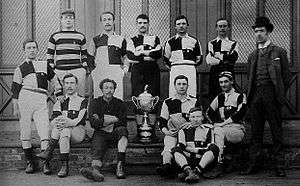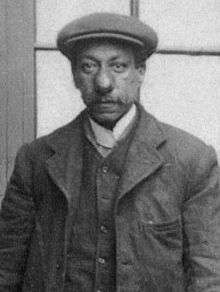Arthur Wharton
 | |||
| Personal information | |||
|---|---|---|---|
| Date of birth | 28 October 1865 | ||
| Place of birth | Ghana | ||
| Date of death | 13 December 1930 (aged 65) | ||
| Place of death | Edlington, Yorkshire, England | ||
| Playing position | Goalkeeper/Winger | ||
| Senior career* | |||
| Years | Team | Apps | (Gls) |
| 1885–1886 | Darlington | 1 | |
| 1886–1888 | Preston North End | 2 | (1) |
| 1889–1894 | Rotherham Town | 0 | (0) |
| 1894–1895 | Sheffield United | 1 | (0) |
| 1895–1897 | Stalybridge Rovers | 4 | (1) |
| 1897–1899 | Ashton North End | 1 | (0) |
| 1899–1901 | Stalybridge Rovers | 1 | (0) |
| 1901–1902 | Stockport County | 6 | (2) |
|
* Senior club appearances and goals counted for the domestic league only. | |||
Arthur Wharton (28 October 1865 – 13 December 1930) is widely considered to be the first black professional football player in the world.[1][2][3] Though not the first black player outright - the amateurs Robert Walker, of Queen's Park, and Scotland international player, Andrew Watson predate him[1] - Wharton was the first black professional and the first to play in the Football League.
Early life, ancestry and early career
Wharton was born in Jamestown, Gold Coast (now Accra, Ghana). His father Henry Wharton was Grenadian, while his mother, Annie Florence Egyriba was a member of the Fante Ghanaian royalty.[4] Wharton moved to England in 1882 at age 19, to train as a Methodist missionary, but soon abandoned this in favour of becoming a full-time athlete.[1]
He was an all-round sportsman - in 1886, he equaled the amateur world record of 10 seconds for the 100-yard sprint in the AAA championship.[3] He was also a keen cyclist and cricketer, playing for local teams in Yorkshire and Lancashire. However, Wharton is best remembered for his exploits as a footballer; while he was not the first mixed-heritage footballer in the United Kingdom — leading amateurs Robert Walker and Scotland international Andrew Watson predate him — he was the first mixed-heritage footballer to turn professional.[3]
Football career

Wharton started as an amateur playing as a goalkeeper for Darlington, where he was spotted by Preston North End after playing against them.[5] He joined them as an amateur, and was part of the team that reached FA Cup semi-finals in 1886-87.[5] Though part of "The Invincibles" of the 1880s,[6] he left Preston in 1888 to concentrate on his running, and thus was not part of the team that subsequently won the Double in 1888-89.[5]
He returned to football in 1889, joining Rotherham Town, signing as a professional. In 1890 he married Emma Lister (1866-1944) at Rotherham in Yorkshire.[7] By 1891 he was the landlord of the Albert Tavern in Rotherham.[8]
In 1894 he moved to Sheffield United, though he was understudy to regular first-team goalkeeper William "Fatty" Foulke.[3] During the 1894-95 season, Wharton played three games for Sheffield United, against Leicester Fosse, Linfield and Sunderland — the latter being a First Division game, making Wharton the first mixed-heritage player to play in the top flight.[3]
In 1895 he left for Stalybridge Rovers but after falling out with the management moved to Ashton North End in 1897, where he opened a tobacconist shop in Ashton-under-Lyne.[9] Ashton North End went bankrupt in 1899, and he returned to Stalybridge Rovers, playing with a young Herbert Chapman, before seeing out his career playing for Stockport County of the Second Division in 1901-02.[5] As well as playing in goal, he would also occasionally feature outfield as a winger. He never won a major honour in the game during his career, nor was he capped at international level.
Legacy

Having developed a drink problem,[1][10] Wharton retired from football in 1902 and found employment as a colliery haulage worker at the Yorkshire Main Colliery in Edlington. By 1911 he was employed as a collier and living in a rented room in Moorthorpe, West Yorkshire.[11] On his death in 1930 he was buried in an unmarked pauper's grave. The grave was given a headstone in 1997 after a campaign by anti-racism campaigners Football Unites, Racism Divides. In 2003 Wharton was inducted into the English Football Hall of Fame in recognition of the impact he made on the game. A campaign to have a statue erected in Darlington as well as in Rotherham to acknowledge Wharton's achievements has gained wide support within the professional game.[12][13] In 2012, a small statue of Wharton was presented to Sepp Blatter at the headquarters of FIFA, where it will be on permanent display.[14] On 16 October 2014, a statue honouring Wharton was unveiled at St George's Park National Football Centre.[15]
References
- 1 2 3 4 "Arthur Wharton". 100 Great Black Britons.
- ↑ Phil Vasili (1998). The First Black Footballer, Arthur Wharton, 1865-1930. Frank Cass. ISBN 0-7146-4903-1.
- 1 2 3 4 5 "Arthur Wharton". Football Unites, Racism Divides.
- ↑ "Arthur Wharton: The Early Years". Arthur Wharton Foundation.
- 1 2 3 4 "Arthur Wharton: The first Black Footballer". BBC.
- ↑ Taw, Thomas (2006). Football's Twelve Apostles: The Making of The League 1886-1889. Desert Island Books. p. 17. ISBN 1-905328-09-5.
- ↑ England & Wales, Free BMD Marriage Index, 1837-1915 for Emma Lister - Ancestry.com pay to view
- ↑ 1891 England Census for Arthur Wharton - Ancestry.com pay to view
- ↑ 1901 England Census for Arthur Wharton - Ancestry.com pay to view
- ↑ Chris Webber, "Black football pioneers from Arthur Wharton to Viv Anderson and beyond", The Observer, 30 August 2009.
- ↑ South Elmsall History Society
- ↑ Arthur Wharton Foundation.
- ↑ "Arthur Wharton: Campaign to honour football pioneer", BBC News, 7 January 2013.
- ↑ Walker, Andy (6 June 2012). "FIFA boss touched by Wharton statue presentation". Northern Echo. Retrieved 7 June 2012.
- ↑ "Pioneer Arthur Wharton honoured at St. George's Park". The FA.
Further reading
- Phil Vasili, The First Black Footballer, Arthur Wharton, 1865-1930: an absence of memory, Frank Cass, 1998 (ISBN 0-7146-4903-1)
- Phil Vasili Colouring Over the White Line. The History of Black Footballers in Britain (ISBN 1-84018-296-2)
External links
- http://www.furd.org/default.asp?intPageID=25 English Football Hall of Fame Profile
- Article on Spartacus Educational
- Official website of the Arthur Wharton Foundation